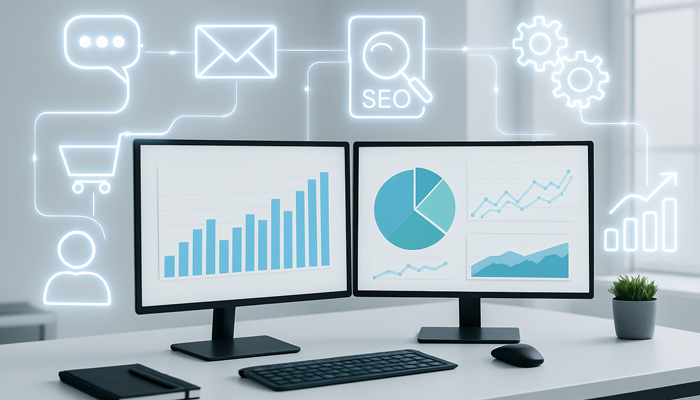In the fast-paced world of modern business, staying ahead requires more than just traditional strategies. Companies are increasingly turning to marketing automation platforms to streamline operations, improve customer engagement, and drive revenue growth. These sophisticated tools, often powered by AI marketing software, are changing the way businesses operate and interact with their audiences.
Understanding Marketing Automation Platforms
Marketing automation platforms are comprehensive systems designed to simplify, automate, and measure marketing tasks and workflows. By integrating multiple marketing channels and managing campaigns from a single interface, these platforms help businesses deliver targeted content, nurture leads, and track performance in real-time. Unlike manual methods, marketing automation platforms reduce human error and save time, allowing teams to focus on strategy and creativity.
AI marketing software is at the core of these platforms, enabling predictive analytics, personalized messaging, and smarter segmentation. With AI-driven insights, businesses can anticipate customer behavior, tailor communications, and optimize campaigns for maximum impact.
Streamlining Customer Engagement
One of the most significant transformations brought by marketing automation platforms is in customer engagement. Traditional marketing often relies on broad, one-size-fits-all messages, but automation allows for highly personalized campaigns. Companies can segment audiences based on demographics, browsing behavior, purchase history, and engagement patterns, ensuring that the right message reaches the right person at the right time.
For example, automated email campaigns can trigger based on specific customer actions, such as abandoning a shopping cart or visiting a product page. AI marketing software further enhances engagement by analyzing user interactions to refine messaging and predict which offers or content will resonate most. This level of personalization leads to higher conversion rates, stronger customer loyalty, and a more meaningful relationship between businesses and their audience.
Improving Lead Management and Sales
Marketing automation platforms are also revolutionizing lead management. These tools track and score leads based on their behavior and engagement, helping sales teams prioritize efforts on high-potential prospects. By automating repetitive tasks such as follow-up emails and reminders, businesses can ensure timely communication without overloading staff.
AI marketing software plays a crucial role in predicting which leads are most likely to convert and which marketing strategies are most effective. By leveraging machine learning algorithms, companies can make data-driven decisions, allocate resources more efficiently, and shorten sales cycles. The result is a seamless alignment between marketing and sales teams, which drives revenue and accelerates business growth.
Enhancing Campaign Performance Through Analytics
Data is a vital asset in modern business, and marketing automation platforms provide comprehensive analytics to measure campaign performance. From website traffic and email open rates to social media engagement and ROI, businesses gain a complete view of how their efforts are performing.
AI marketing software takes analytics a step further by offering predictive insights. For instance, it can identify trends in customer behavior, forecast future sales, and recommend optimizations for ongoing campaigns. This proactive approach enables businesses to stay ahead of market shifts, adapt strategies quickly, and make informed decisions that improve overall marketing effectiveness.
Cost Efficiency and Resource Optimization
Implementing marketing automation platforms can significantly reduce operational costs. By automating repetitive tasks, businesses save time and reduce the need for extensive manual intervention. Marketing teams can focus on high-value activities such as strategy development, content creation, and customer relationship management.
Moreover, AI marketing software ensures that marketing budgets are used efficiently. By analyzing campaign data and performance metrics, businesses can identify underperforming initiatives and reallocate resources to high-impact areas. This not only maximizes ROI but also reduces wastage of time, effort, and funds.
Driving Consistency Across Channels
Maintaining consistent messaging across multiple marketing channels is a challenge for many businesses. Marketing automation platforms simplify this by centralizing campaign management. Whether it is email marketing, social media, or website content, businesses can ensure that their messaging remains cohesive, aligned with brand values, and tailored to the target audience.
AI marketing software contributes to consistency by analyzing content performance and suggesting improvements. It can recommend the best times to post, the type of content that resonates with audiences, and even the tone and style that drives engagement. This level of insight ensures a strong, consistent brand presence across all touchpoints.
Preparing for the Future of Marketing
The rise of marketing automation platforms and AI marketing software represents a fundamental shift in how businesses approach marketing. Companies that embrace these technologies gain a competitive edge by being more agile, data-driven, and customer-focused. Automation reduces the complexity of marketing operations while AI enhances decision-making, personalization, and efficiency.
As technology continues to evolve, businesses will increasingly rely on these platforms not just for campaign management but as strategic tools that shape growth and innovation. Organizations that adopt marketing automation early will be better positioned to respond to customer needs, capitalize on emerging trends, and thrive in an increasingly competitive landscape.
Conclusion
Marketing automation platforms are transforming modern businesses by simplifying operations, enhancing customer engagement, improving lead management, and providing valuable analytics. AI marketing software within these platforms adds predictive insights, personalization, and strategic decision-making capabilities. By integrating these technologies, businesses can achieve greater efficiency, higher ROI, and stronger connections with their audiences.
In a world where speed, precision, and relevance determine success, marketing automation platforms are no longer optional—they are essential tools for businesses looking to excel in the digital age.

